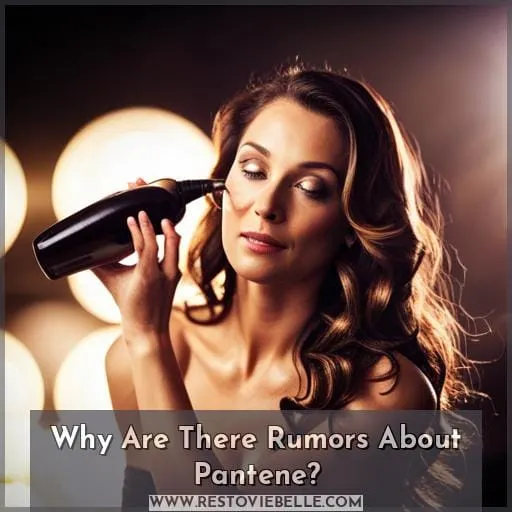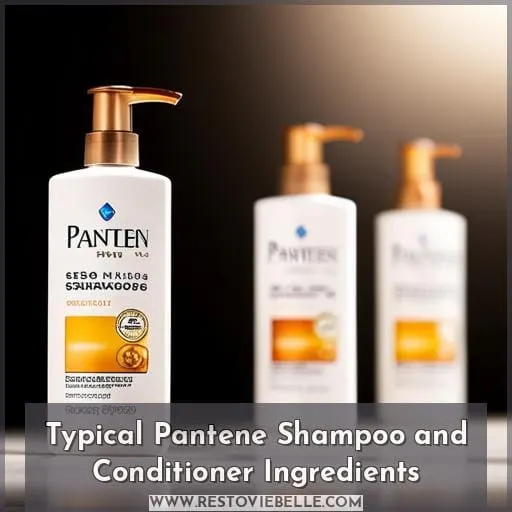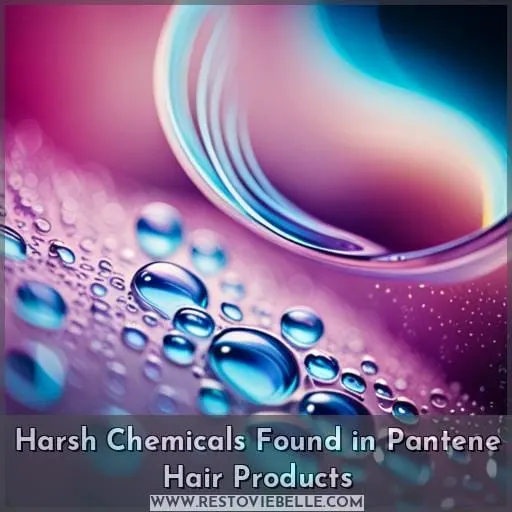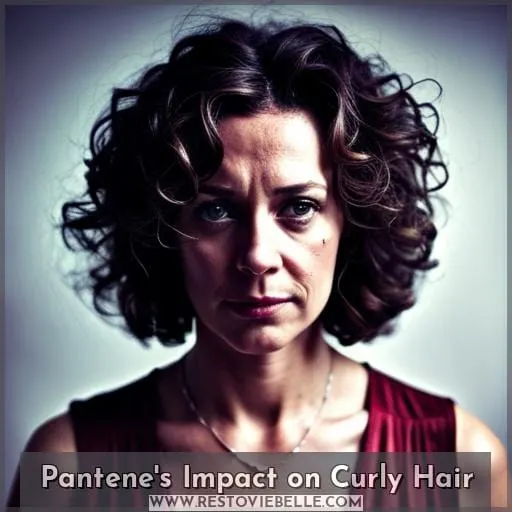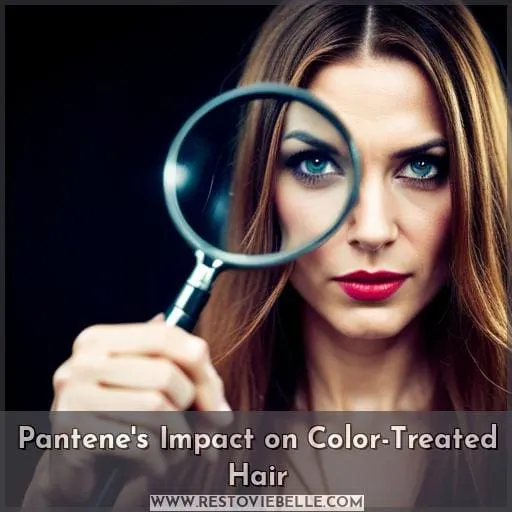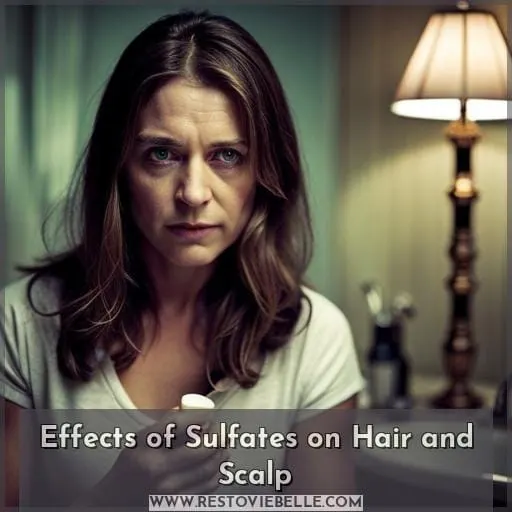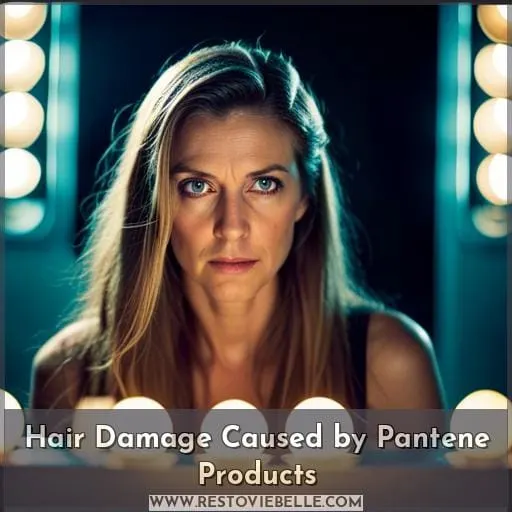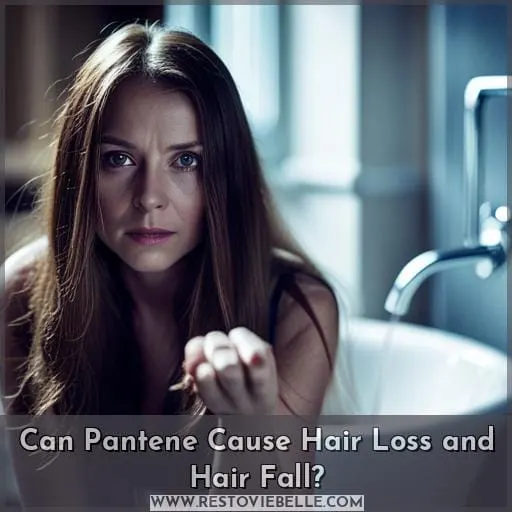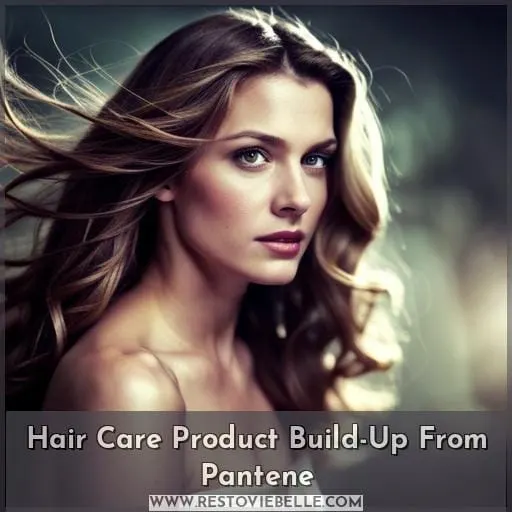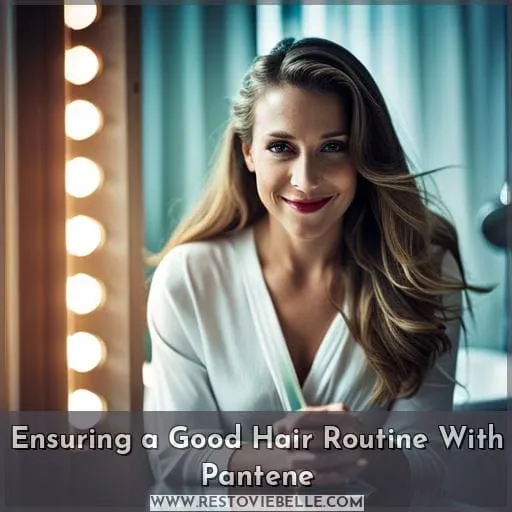This site is supported by our readers. We may earn a commission, at no cost to you, if you purchase through links.
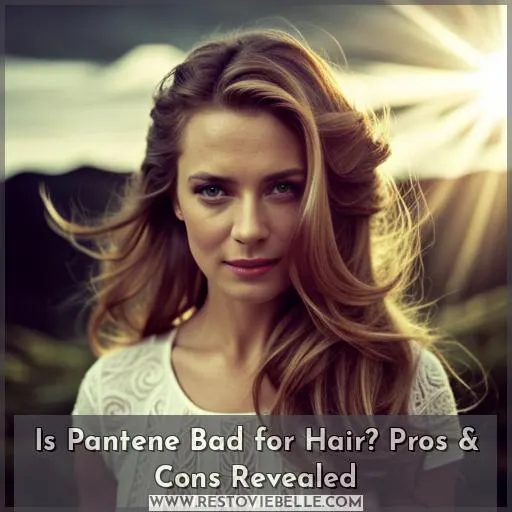 Have you ever wondered if Pantene is bad for your hair? It’s a question that many have debated, with rumors swirling online about the potentially harmful ingredients found in these drugstore shampoos.
Have you ever wondered if Pantene is bad for your hair? It’s a question that many have debated, with rumors swirling online about the potentially harmful ingredients found in these drugstore shampoos.
This article will break down all the facts – from typical Pantene shampoo and conditioner ingredients to their effects on color-treated and curly hair – so you can make an informed decision about what products are best for your locks.
From harsh chemicals known to damage scalp health, to sulfates causing dryness and even potential hair fall; it’s time we separate fact from fiction when it comes to understanding whether or not Pantene is bad for our tresses.
With this knowledge in hand, let us take steps towards ensuring healthy haircare routines with or without using Pantene products!
Table Of Contents
- Key Takeaways
- Why Are There Rumors About Pantene?
- Typical Pantene Shampoo and Conditioner Ingredients
- Harsh Chemicals Found in Pantene Hair Products
- Pantene’s Impact on Curly Hair
- Pantene’s Impact on Color-Treated Hair
- Effects of Sulfates on Hair and Scalp
- Hair Damage Caused by Pantene Products
- Can Pantene Cause Hair Loss and Hair Fall?
- Hair Care Product Build-Up From Pantene
- Ensuring a Good Hair Routine With Pantene
- Frequently Asked Questions (FAQs)
- Conclusion
Key Takeaways
- Rumors about harmful ingredients and Pantene’s effects
- Importance of researching and considering product ingredients
- Breakdown of Pantene’s ingredients and their effects on different hair types
- Tailoring product selection to individual hair needs
Why Are There Rumors About Pantene?
You may have heard rumors about Pantene, but it’s important to understand the ingredients and individual hair needs before making any decisions. Silicone safety is a key factor when considering Pantene products. While silicone can help with moisture retention, too much buildup can lead to weighed-down hair.
Meanwhile, the risks of parabens are debated. Whether or not they cause health problems remains inconclusive for now. Patch tests before regular use are recommended in order to gauge how these ingredients will affect your scalp and hair texture.
Different product ranges cater specifically for diverse needs. There are sulfate-free shampoo options, clarifying shampoos that address buildup from silicones, leave-in conditioners that provide long-lasting hydration without weighing down strands of curls or colored locks, as well as deep conditioning masks essential after chemical treatments like bleaching or coloring jobs.
Understanding individual sensitivity levels and analyzing ingredient lists helps identify potential risks beforehand. This way, you can make an informed decision regarding what works best for your specific hair type.
Typical Pantene Shampoo and Conditioner Ingredients
You may have heard rumors about Pantene being bad for your hair. Let’s look into the typical ingredients of their shampoos and conditioners to understand why they’re used and how they affect different types of hair.
A common cleansing agent in Pantene products is Sodium Laureth Sulfate (SLES). Cocamidopropyl Betaine gives these products gentle lathering, while Glycol Distearate improves texture.
There are also some concerns about SLS & ALS potentially causing irritation, but these chemicals occur in limited concentrations with an emphasis on rinsing thoroughly after use. Silicones present in many conditioners can cause build-up if not balanced with a clarifying shampoo.
To sum up, understanding ingredients will help you make informed choices when selecting a suitable product from tailored collections offered by Pantene, such as silicone-free alternatives as well as sulfate-free options, which cater specifically towards those looking out for more natural solutions without compromising safety standards set by the brand itself.
Harsh Chemicals Found in Pantene Hair Products
SLS and ALS are potential irritants commonly found in Pantene’s products, so it’s important to thoroughly rinse them off after use. Parabens can cause allergic reactions, scalp irritation, and potentially long-term risks like hair loss or damage.
Silicone buildup from conditioners is another concern that needs attention as it may weigh down your hair and lead to further damage if not regularly removed with clarifying shampoo.
Patch testing before regular use of any product helps identify any ingredients you’re sensitive to, which could result in an adverse reaction on the skin or scalp area. Furthermore, knowing your own unique hair texture is key for choosing a suitable product range, as some formulas work better on certain types than others.
Sulfates strip away oils, resulting in dryness, while paraben-free options might be best suited for those who have sensitivities or allergies.
In terms of overall hair care advice, choose wisely based on individual needs and always read ingredient lists carefully!
Pantene’s Impact on Curly Hair
Curly hair can suffer from dryness and brittleness due to Pantene’s sulfates, making it difficult for those with curly hair to maintain their natural curls. Co-washing may be a better option for this type of hair as it involves cleansing without the use of harsh chemicals like sulfates.
Additionally, checking ingredient lists is important when selecting products tailored specifically for your scalp health needs.
In terms of damaging effects on curly hair specifically, certain ingredients such as silicones can lead to buildup. This buildup weighs down the strands and makes them look dull or flat over time if not managed properly in one’s haircare routine.
Thus, understanding individual needs should determine whether Pantene is an appropriate choice or not. This should be based on personal experiences with different product ranges available by the brand.
These ranges will cater most appropriately according to one’s type and texture care requirements. It is important to avoid any potential harm caused by unsuitable formulas used too regularly. Instead, they should be used occasionally when needed only after assessing their suitability first before starting to use them more often than necessary.
Pantene’s Impact on Color-Treated Hair
If you’ve color-treated your hair, sulfates in Pantene products may cause dryness and brittleness.
- Fading dyes – Sulfates strip away oils that help protect the color of dyed hair, leading to fading quicker than desired.
- Brittleness – Color-treated strands can become brittle due to chemical buildup from the dye as well as sulfate cleansers like those found in many popular beauty brands such as Pantene’s Pro-V collection, which contain parabens known for scalp irritation and potential long-term risks.
- Moisture balance – Dimethicone helps lock moisture into strands but also contributes to excess buildup when used too often on colored tresses.
- Shine – Glycol Distearate improves texture while adding shine without further drying out already weakened locks after coloring treatments.
To ensure healthy vibrant hair, it is important to choose shampoos specifically tailored towards preserving colors so that they last longer while providing nourishment, hydration, and protection with minimal damage or interference with any current home care routine regime being followed by an individual who has chosen their favorite shade of hue using a professional salon-quality haircare brand such as Pantene’s Pro V Gold Argan Shampoo Conditioner designed especially for color-treated hair types.
Effects of Sulfates on Hair and Scalp
The effects of sulfates on the hair and scalp can be significant. While they’re effective in cleansing, their harshness can cause drying effects, product buildup, and scalp irritation. Protective measures, such as using a Pantene Pro-V conditioner with natural oils or switching to sulfate-free shampoo, may help reduce these risks.
Additionally, selecting products that nourish strands instead of stripping them is key for keeping the hair healthy while avoiding potential damage from overuse or too much exposure to harsh chemicals.
| Risk Factors | Mitigation Strategies |
|---|---|
| Drying Effects/Product Buildup | Switch to Sulfate-Free Shampoo |
| Scalp Irritation | Pantene Pro-V Conditioners with Natural Oils |
| Hair Fall | Select Products That Nourish Strands |
| Silicone Buildup |
Hair Damage Caused by Pantene Products
Using Pantene products can lead to hair damage if not chosen and used wisely. Its history of harsh chemicals, such as sulfates, parabens, and silicones, has been linked to scalp irritation, dryness, and breakage.
Over time, this may result in split ends, thinning hair, or even complete hair loss due to further damage being done from the ingredients present in Pantene’s product range.
Furthermore, these same elements are also responsible for controversies surrounding the brand that must be taken into consideration when deciding whether or not it is suitable for your own use. Researching individual products before purchasing them is essential. Avoiding those with known damaging ingredients will ensure better results regarding the overall healthiness of your locks over a prolonged period of time without risking potential issues like scalp inflammation or an unhealthy balance between moisture levels on both the head skin and strands themselves.
This could cause more severe problems down the line if they remain unchecked by proper care routine changes accordingly.
Can Pantene Cause Hair Loss and Hair Fall?
It’s possible that using Pantene products could lead to hair loss and hair fall, depending on the individual’s scalp sensitivity and hair type. Deep conditioning treatments may help reduce the risk of damage from styling or harsh ingredients found in some products, such as parabens.
To be safe, it’s best to read product reviews carefully for signs of potential irritation or other issues with a certain formula before buying. It may also be helpful to research ingredient safety ratings, which can provide valuable insights into what might potentially cause harm when used regularly over time.
Similarly, it pays off to read shampoo and conditioner labels closely, looking out for those chemicals known to irritate the scalp, like sodium lauryl sulfate (SLS) or ammonium laureth sulfate (ALS). Hair care controversies surrounding certain brands shouldn’t stop you from finding one that suits your needs; just choose wisely after conducting background checks on safety records associated with each item’s unique formulation.
Hair Care Product Build-Up From Pantene
Hair care product build-up from Pantene is a popular concern among consumers. Many people worry about the potential for hair loss and damage due to using these products. To ensure safe use of Pantene, it’s important to select the right product based on your hair texture and scalp sensitivity.
Researching ingredient lists in advance can help you make an informed decision that suits your needs best. In addition, testing out new products before committing fully can give insight into its effects on your specific hair type and porosity levels for optimal nourishment without buildup over time.
When looking at different selections of shampoos or conditioners, understanding what each key ingredient does will provide more clarity when making a purchase, as well as how often certain products should be used depending on individual preferences or desired results.
Ultimately, choosing the right shampoo with proper usage comes down to research, product selection, and consistent evaluation of one’s own experience with particular brands such as Pantene, so there are no surprises along their haircare journey.
Ensuring a Good Hair Routine With Pantene
To maximize the benefits of Pantene, it’s important to find a tailored hair routine designed for your individual needs.
- Understand your hair type and texture to choose suitable products from Pantene’s product lines.
- Protect delicate strands with weekly deep conditioning treatments or hot oil masks for added nourishment and moisture retention.
- Select silicone-free conditioners to reduce product buildup on the scalp without sacrificing hydration levels in your hair shafts.
- Use clarifying shampoos at least once a month to remove dirt particles, excess oils, build-up residue left by styling products, and other impurities that could damage healthy follicles over time.
- Incorporate ingredients like panthenol into any beauty regimen as they keep locks strong while preventing split ends from forming.
By following these tips, you can keep your tresses looking great using safe Pantene formulations that won’t lead to further damage down the line!
Frequently Asked Questions (FAQs)
Does Pantene Test on Animals?
No, Pantene does not test on animals. For instance, their commitment to cruelty-free practices has been verified by the Leaping Bunny Program and PETA’s Beauty Without Bunnies program. They proudly champion ethical beauty standards, ensuring products are safe for consumers, and respecting animal welfare.
Is Pantene Vegan and Cruelty-Free?
Pantene is a cruelty-free and vegan brand, with no ingredients derived from animals. Their products are free from parabens, sulfates, and dyes for a gentle feel on your hair.
Are Pantene Products Safe for Kids?
Pantene products are generally safe for kids; however, it’s important to keep an eye on the ingredients. While the brand offers tailored collections designed to meet a variety of needs, parents should do their due diligence when selecting items.
After all, you don’t want your little one swimming in deep waters! With some research and care, you can ensure your child is well taken care of with Pantene.
Is Pantene Safe During Pregnancy?
Pregnant women can safely use Pantene products. The Pro-V Gold Argan Shampoo Conditioner is paraben, sulfate, and dye-free; it nourishes and strengthens hair with Argan Oil. Other collections are tailored to specific needs, so you can find one that suits your unique situation for a safe pregnancy experience.
How Much Pantene Should I Use?
Want healthy hair? Use Pantene sparingly – a little goes a long way! Start with just one pump of shampoo and conditioner, then adjust according to your needs.
Conclusion
All said and done, it’s clear that Pantene is neither a complete blessing nor a total disaster for your hair. Like many things in life, it has its pros and cons, and whether it’s the right fit for you comes down to understanding your individual hair needs.
To make sure you get the best out of Pantene, it’s important to choose the right product for your hair type and to keep a close eye on how it affects your hair. To put it in a nutshell, it’s essential to do your research and find the balance between the benefits and drawbacks of using Pantene for your hair.

